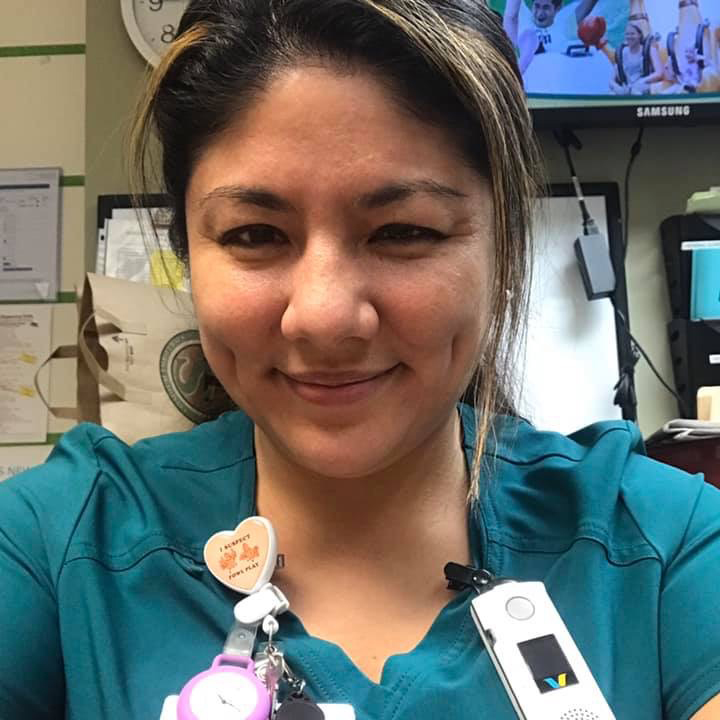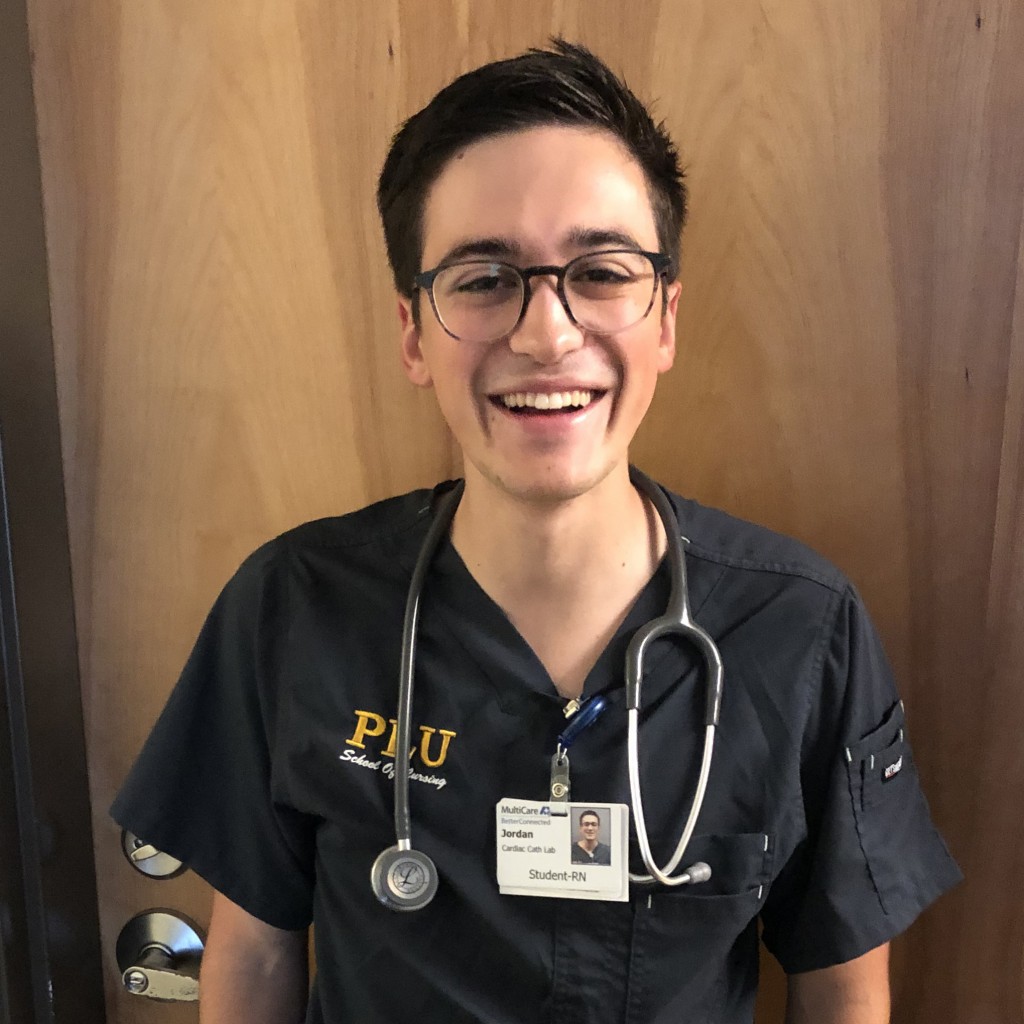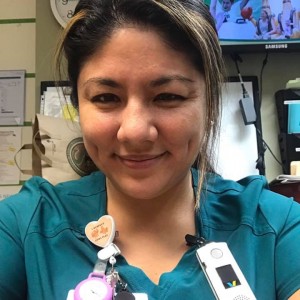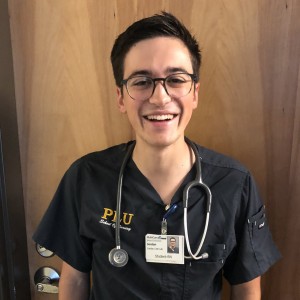
Adrian Brown ’20, BSN Candidate

Jordan Brown ’20, BSN Candidate
Current nursing students Jordan Brown ’20 and Adrian Brown ’20 will graduate in May, but they’re still excited for the new PLU School of Nursing Clinical Learning and Simulation Center that will open this fall. (OK, they might be a bit jealous…) In the new center, PLU Nursing students will have access to double the learning space and state-of-the-art equipment and technology.
PLU sat down with Jordan and Adrian in February to learn more about why they chose PLU for nursing, what makes a PLU nurse distinctive, and how the new center will make a difference.
PLU: OK, first question. Are you related?
Adrian: Haha, no — not that we know of!
Jordan: We are friends, though.
PLU: Now that we can move on to other topics… What’s the most important thing to know about your story?
Adrian: I’m a first-generation college student. My mom never completed 7th grade and my dad didn’t graduate from 9th. By the time I was 21, I had four kids and lived in a tent. But I always knew I wanted to go to college.
Jordan: I have a strong faith background, and I most closely identify with the Lutheran faith. Service is really important to me and so are relationships. I grew up in Spokane, Washington, and went straight to college from high school.
PLU: Why did you choose to become a nurse?
Adrian: For a lot of reasons. I’ve always loved the sciences and learning about biology and anatomy. I was the kid in school who would take photos during dissections. But I ended up going to school for criminal justice, then I became an EMT. As an EMT, I began feeling like I wanted to do even more to care for people than I could.
Jordan: It seems for many of us, there’s always a person who gets you into the field. My grandma and mom were those people for me — they were both nurses.
I also had a really personal experience with nurses that made a big difference for me. When I was 13, my best friend got sick with cancer. I saw the impact nurses had on him and his treatment and started thinking about going into nursing then. When I got to PLU, I saw how relationship-focused and service-oriented nursing is, and I knew it was the profession for me.
Adrian: Yes, those personal experiences are so important! One of my cousins passed away from respiratory syncytial virus. Then my husband’s grandfather passed away and then my dad and step-dad both passed away within days of each other. These experiences were heartbreaking — but they also gave me the perspective of being on the other end of care. I saw nurses taking care of my family members and wanted to be helping at that level too.
PLU: Why did you choose PLU Nursing?
Adrian: When I was looking around and learning about my options, PLU just kept coming up. I was accepted to other programs, but when I received my acceptance letter to PLU, I cried. PLU was my number one choice.
Jordan: I chose PLU because of its emphasis on service and care. When I looked at other schools it just felt like something was missing. They might have great facilities or really nice people, but those other programs don’t have that real emphasis on service and care that we do here at PLU.
PLU: What do you think makes PLU nurses unique?
Adrian: Lots of things. For example, during clinicals, I would hear supervisors saying, ‘We want PLU students to get here early so we can assign them to our unit first.’ I just think nurses are more prepared at PLU. Patient safety is our first and foremost priority, and we provide care to the whole family.
Jordan: I hear a lot of different things. At clinical sites, I hear that PLU nursing students are courageous and aren’t scared of jumping into difficult situations. I also hear that our therapeutic care and communication skills set us apart — both are emphasized from the first semester all the way through clinicals. You can teach someone nursing skills, but that personal connection can still be missing. PLU makes sure we have both the hard skills and the relational skills to be the best nurses we can.
Nursing is way ahead in care, but we're behind when it comes to training equipment and tools.
PLU: Does PLU Nursing need new technology and equipment?
Adrian: Oh yes! PLU is behind when it comes to training technology and equipment. Right now, our supervisors are surprised when we aren’t familiar with today’s equipment. It’s embarrassing and slows us down.
Jordan: Definitely! Our clinical sites have state-of-the-art equipment. What’s here maybe was state-of-the-art 15-20 years ago but now no longer is. Not having updated equipment to train on means that we have to adjust when we get to the clinical site. Having new technology and equipment to practice on at PLU would make me feel more confident going into clinicals.
PLU: Tell me about your experience training with current PLU equipment ?
Jordan: Honestly, our patient manikins are a… bit of a wreck. Parts are falling off all the time while we’re practicing. For instance, I remember learning vital signs my first semester. I was turning a manikin patient and putting a blood pressure cuff on the arm. When I went to take off the cuff, the whole arm popped off! That’s obviously not how it’s supposed to go, but I couldn’t help but wonder if I had done something wrong. Sure, it’s a bit funny, but it also breaks our focus caring for that manikin as if it were a real patient.
Adrian: Functioning manikins also help break down student inhibitions and make students more comfortable in a real-life care setting. When I came to PLU, I couldn’t connect with the manikins we have here… even with all the patient contact I’ve had in the past. I’d be giggling about the parts that were falling off while I was trying to practice and learn.
PLU: Why did you choose PLU in spite of the equipment?
Adrian: Because of the reputation of the nursing program and its professors. Plus, PLU has the ability to place students out in the community to learn. For me, equipment was on the back burner when I was applying, but once I got in, I really saw how obsolete it was. PLU Nursing is way ahead in care, critical thinking, evidence-based practice, but we’re behind when it comes to training equipment and tools.
PLU: How did you feel when you found out about the Center and what would be in it?
Jordan: Super excited! The updated equipment will help students transition into the clinical site in a more seamless way. Having more emphasis on simulation will also be really important. There are definite limitations to just focusing on clinical learning. For instance, maybe in your clinical time you won’t see certain things you need to experience so you can train, feel confident and do well. The simulation helps fill in skills and gaps. I’ve done one to two simulation labs. I’m jealous students will get to do more of it starting in the fall.
Adrian: I sit on PLU’s Curriculum and Instruction Committee meetings each month, so I knew the project was coming and got to hear the progress and see the blueprints. I’m sad I won’t be here when the new Center is open but I’m very excited for the students who will get to use it — state-of-the-art equipment and a space dedicated to nursing. I mentor first-year nursing students and tell them, ‘You’ll be so much better than me!’
I often hear from patients, ‘I want the PLU nurse.’ This is an investment in the PLU nurses of tomorrow.
PLU: What would you say to someone who is supporting the new center and students like you?
Jordan: I heard a PLU nursing alumna say about the project, ‘Investing in this center is investing in generations of care.’ It shows how tangible this Center’s effect is — generations of care. When I’m at a local clinical site, I often hear from patients, ‘I want the PLU nurse.’ This is an investment in the PLU nurses of tomorrow.
Adrian: Absolutely — I’m already planning to give back to PLU Nursing as an alumna. Equipment for the new Center is an investment in tomorrow’s care. This is for the nurses who will take care of us and our families for generations to come.
Jordan: Current students are so excited for the space! Any amount of help will usher in the next generation of nurses and this new era of nursing at PLU.
PLU: Thank you for your time and good luck to you as you wrap up your PLU nursing student experience and become a PLU nurse!




